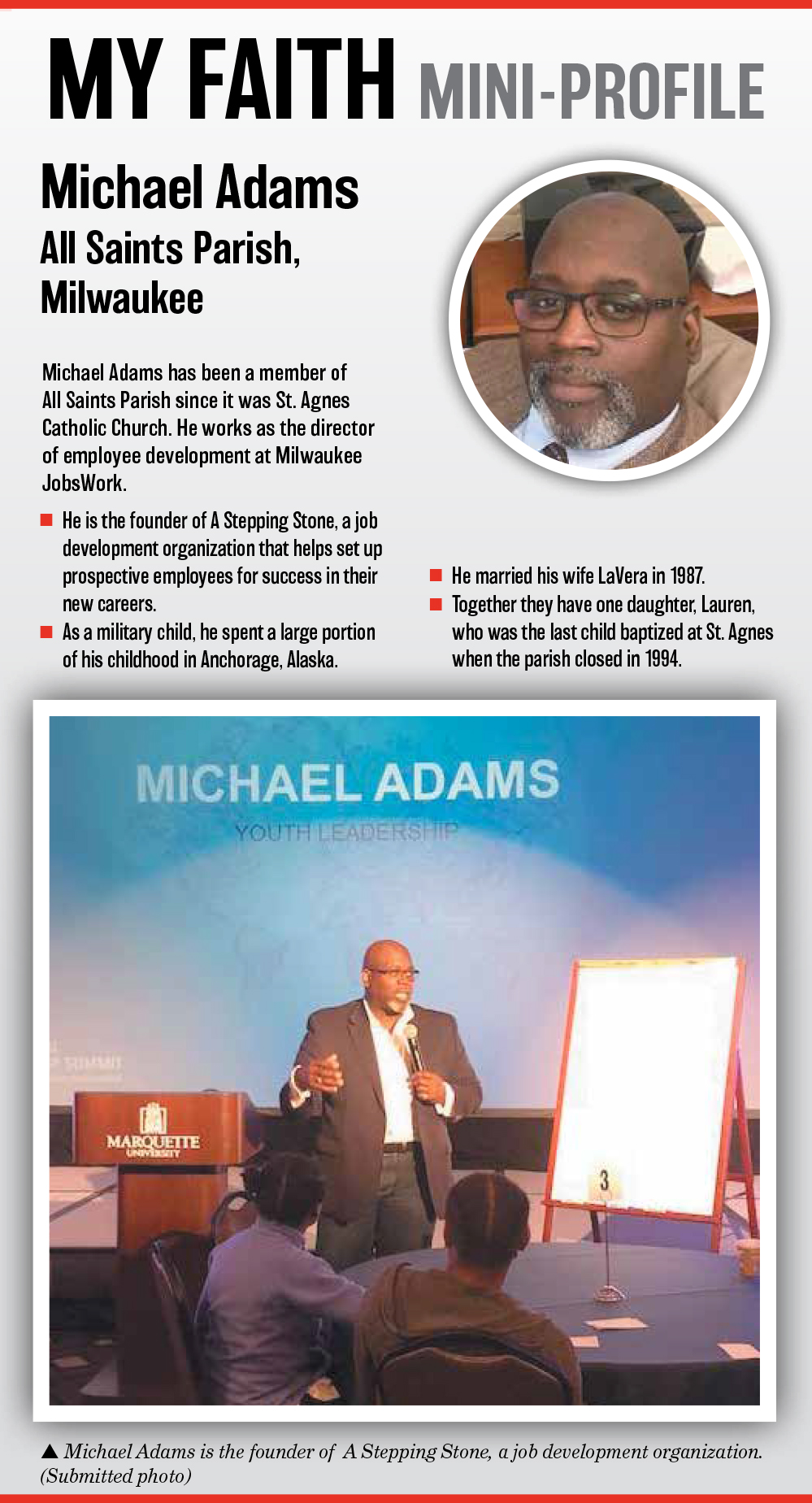CALLIE GAY
SPECIAL TO THE CATHOLIC HERALD
You attended Messmer High School. What do you remember most about your high school days? 
Catholic high school was really the dream of my parents. They wanted me to grow up with a strong Catholic foundation, and after moving around a lot, coming to Milwaukee, and Messmer was amazing. I was a drummer in every band they had for years. I studied martial arts, and enjoyed the rich Catholicism that school was able to provide. We grew up there to know that you look at people, not their color or what they have. We really had wonderful learning about Jesus’ walk and our role in what that means.
After moving to Chicago for a job opportunity, what brought you and your wife back to Milwaukee?
Milwaukee was always home. We were blessed to be able to find a great church community in Chicago and we enjoyed it, but nothing was like All Saints. We came back here every weekend or every other weekend and we stayed very active in our parish here. The center of what we did was always around our church home. I’ve always understood that with the leadership and support of a good home church, a community can really thrive.
You have a great passion for building community. In your opinion, what’s the most important piece to achieving a solid and engaged group of individuals?
When we’re working in our church, I always try to look around and make sure that the work we’re doing is helping those folks who know us but also maybe more importantly, those who don’t know us. Those are the people we need to make sure we speak to and who maybe haven’t been touched or who don’t know the value of brothers and sisters living together through Christ Jesus. We have to share who we are and what we do as Catholics, I don’t think we’ve done enough of that, particularly in an urban setting.
You received the Vatican II award in 2018; what did that mean to you?
I was honored but I didn’t realize the impact that award had to have on our community. Fr. Jack Kern sat me down and told me that I had to accept it and then to live it, that it isn’t just about what I did but about what I am going to do, and keep that work alive and keep serving and loving those in our community and really know our brothers and sisters.
What work led to you receiving that award?
I am so blessed to be part of the organization Milwaukee JobsWork that my partner and I started, and I love that work, so I think that’s part of what the archbishop saw. But I think the other part of it is just the work I do as a guy who goes to All Saints Church, who goes St. Francis Church, who goes to St. Martin De Porres. I go to all of those churches as a guy who just wants to help. I want to roll up my sleeves and help and speak on Black issues, particularly those that are affecting Black Catholics.
What are the issues affecting Black Catholics in Milwaukee that you are passionate about changing?
In the past few months, we’ve all heard a lot of names in the news – George Floyd, Joel Acevedo – and I think the biggest issue is that we have to come together to ask the people who have the power to change policies to make sure that change happens so that it’s about right and wrong, not the color of someone’s skin. As Black Catholics, we have to support each other in what we do and ask. How are we making sure that folks around us are being seen in the light that Jesus has always told us to? There are so many people doing good work and what we have to do is support each other selflessly. It has to be for the good of the community, not for our own personal good. We have to bring hope. We have to talk and have a dialogue like you and I are having now.
Milwaukee is one of the most segregated cities in the country; have you seen that translate to our parishes?
It’s sad to say that sometimes you can go to church and you don’t see another Black person, or feel welcome. Sometimes, I get in my car and go out to visit other churches and it’s sad to say I’ve had that experience. It’s OK to not see another person who looks at you, but what’s not OK is not getting that greeting, hearing, “Hey brother, how are you? Come sit with us.” We have to be better than that.
How do you make a change?
By investing in people, in every conversation and interaction. I want people to start talking about race, about white privilege, that it isn’t your fault for having it but it becomes a problem when people know they have it and they continue to use it. Have conversations. Have a conversation one-on-one that is going to end in a fruitful way and continue.
